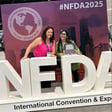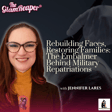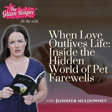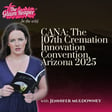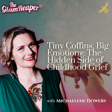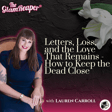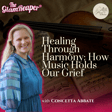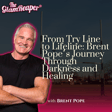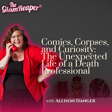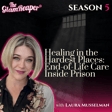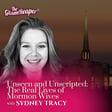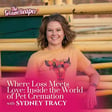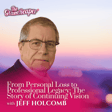
The Revival of Keening: Ireland’s Ancient Grief Ritual Returns
In this episode of the Glam Reaper Podcast, Jennifer has a thoughtful conversation with Kevin Toolis, a writer and BAFTA-winning filmmaker, as they dive into the often overlooked aspects of death and the rituals that surround it.
Kevin shares stories from his Irish and Scottish roots, reflecting on how these cultural traditions have shaped his views on life and death. He introduces the Irish wake, a communal and therapeutic practice that offers a striking contrast to modern funeral customs. Drawing from his book, My Father's Wake, Kevin reveals how the open nature of Irish wakes provides a space for grieving and healing, emphasizing the importance of properly honoring the dead.
Tune in to explore the timeless rituals that influence our understanding of life, death, and the healing power of communal grief.
Key Topics:
-Kevin Toolis shares his deep cultural roots and family history
-The healing power of the Irish wake in grief
-How modern funeral practices change our way of grieving
-The comforting role of keening in collective mourning
-The keening festival’s efforts to keep these rituals alive
Quotes From The Episode:
“The first best hope of life is that you will be born into a family and people who will love you and the last best hope of life is that you will die within a community who will love you too”
- Kevin Toolis
“We kind of are born into this world, naked, with no shame, no guilt, you know nothing, and then we go back basically naked”
- Jennifer Muldowney
Timestamp:
[00:00] Podcast Intro
[00:23] Kevin shares insights about his Irish and Scottish heritage, his life on Achill Island, and his book on the traditional Irish wake.
[05:28] Kevin elaborates on his book "My Father's Wake: How the Irish Teach Us to Live, Love, and Die.
[09:36] Jennifer reflects on the complexities of Irish attitudes toward death and funerals.
[15:17] Kevin contrasts the differences between Irish and English funeral practices.
[17:29] Jennifer shares her perspective on the importance of modernizing the Irish wake to create personalized.
[20:02] Kevin discussed the ancient and cross-cultural tradition of keening.
[25:22] Kevin conveyed that the Keening Festival was a tremendous success.
[27:15] Kevin emphasized that the festival is designed to be participatory rather than academic.
[28:50] Outro
Connect with Kevin Toolis:
LinkedIn - linkedin.com/in/kevin-toolis-43a48912
Website - www.wondersofthewake.com
Instagram - @thewondersofthewake
Twitter/X - @KevinToolis
Facebook - https://www.facebook.com/kevin.toolis/
Connect with Jennifer/The Glam Reaper on socials at:
Facebook Page - Memorials
https://www.facebook.com/MuldowneyMemorials/
Instagram - @muldowneymemorials
Email us - glamreaperpodcast@gmail.com
Listen to The Glam Reaper Podcast on Apple Podcasts:
https://podcasts.apple.com/us/podcast/the-glam-reaper-podcast/id1572382989?i=1000525524145
YouTube - https://www.youtube.com/channel/UCWe3sNoPny6UsMGYoYDeXfw


